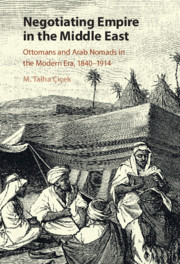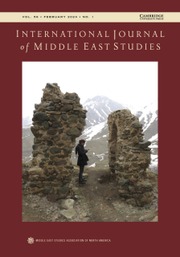Negotiating Empire in the Middle East
Ottomans and Arab Nomads in the Modern Era, 1840–1914
$29.99 USD
- Author: M. Talha Çiçek, Istanbul Medeniyet University
- Date Published: July 2021
- availability: This ISBN is for an eBook version which is distributed on our behalf by a third party.
- format: Adobe eBook Reader
- isbn: 9781009003711
Find out more about Cambridge eBooks
$
29.99 USD
Adobe eBook Reader
Other available formats:
Paperback, Hardback
Looking for an inspection copy?
This title is not currently available on inspection
-
In the early 1840s, Ottoman rulers launched a new imperial project, partly in order to reassert their authority over their lands and subjects, crucially including the Arab nomads. By examining the evolution of this relationship between the Ottoman Empire and Arab nomads in the modern era, M. Talha Çiçek puts forward a new framework to demonstrate how negotiations between the Ottomans and the Arab nomads played a part in making the modern Middle East. Reflecting on multiple aspects of Ottoman authority and governance across Syria, Iraq, Arabia, Transjordan and along their frontiers, Çiçek reveals how the relationship between the imperial centre and the nomads was not merely a brutal imposition of a strict order, but instead one of constant, complicated, and fluid negotiation. In so doing, he highlights how the responses of the nomads made a considerable impact on the ultimate outcome, transforming the imperial policies accordingly.
Read more- Introduces the politics of negotiation as a framework for understanding Ottoman history
- Reflects on multiple aspects of Ottoman governance across Syria, Iraq, Arabia, Trans-jordan since 1840
- Demonstrates how Bedouin socio-political agency played a constructive part in the making of the modern Middle East
Reviews & endorsements
'It is usually assumed that the relations of nomads and the Ottoman state were a one-way street: the state ordered and the tribes revolted or obeyed. Talha Çiçek's book shows us that the reality was much more ambivalent and interesting. This book is a pioneering exposition of a fascinating and complicated relationship between the Ottoman state and the Arab nomads in the 19th century.' Selim Deringil, Lebanese American University
See more reviews'Çiçek's fine study of the relations between the Ottoman government and major Arab nomadic groups lies at the cross-section of two booming fields: historical work on Bedouins and theoretical debates imperial centers and peripheries. Set in a wider comparative perspective and tapping into unused archival records, Çiçek offers important new perspectives.' Ulrike Freitag, Leibniz-Zentrum Moderner Orient
'This exemplary study based on impeccable archival research and exhaustive grasp of historical developments provides a fresh perspective on post-Tanzimat Ottoman policies regarding Arab nomads. It successfully demonstrates that the Ottoman center adopted a flexible and negotiable policy instead of a rigid principle with only one means of implementation vis-à-vis its tribal populations.' M. Şükrü Hanioğlu, Princeton University
'… a welcome addition to several overlapping empirical and theoretical fields … Highly recommended.' R. A. Miller, Choice Connect
Customer reviews
Not yet reviewed
Be the first to review
Review was not posted due to profanity
×Product details
- Date Published: July 2021
- format: Adobe eBook Reader
- isbn: 9781009003711
- availability: This ISBN is for an eBook version which is distributed on our behalf by a third party.
Table of Contents
Introduction
1. Conflict: The Imperial Attempts to Terminate the Nomadic Domination in the Arab Countryside and the Tribal Response
2. Reinforcement: Land Settlements and Military Fortification in the Desert and Its Frontiers, 1840–1870
3. Expansion, Reaction, and Reconciliation I: Establishment of the Deir al-Zor Mutasarrıfate and the Reconciliation with the Fid'an and Deir al-Zor's Shammar
4. Expansion, Reaction and Reconciliation II-The Nomads and Extension of the Ottoman Administration into the South of Syria
5. Partnership, Provincialization and Conflict: The Shammar in the Provinces of Mosul, Baghdad and Deir al-Zor, 1870–1914
6. Taxation: The Collection of the Shammar and Anizah Duties
7. Justice: The Imperial Legal System and the Bedouin Disputes
Conclusion.
Sorry, this resource is locked
Please register or sign in to request access. If you are having problems accessing these resources please email [email protected]
Register Sign in» Proceed
You are now leaving the Cambridge University Press website. Your eBook purchase and download will be completed by our partner www.ebooks.com. Please see the permission section of the www.ebooks.com catalogue page for details of the print & copy limits on our eBooks.
Continue ×Are you sure you want to delete your account?
This cannot be undone.
Thank you for your feedback which will help us improve our service.
If you requested a response, we will make sure to get back to you shortly.
×


